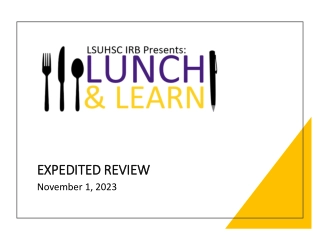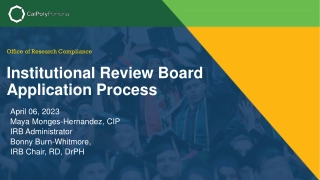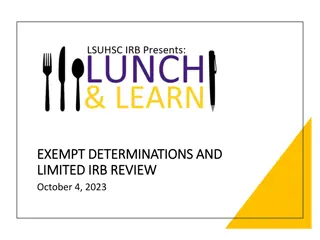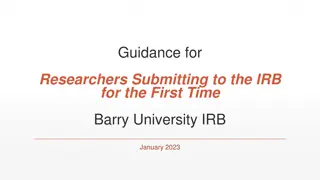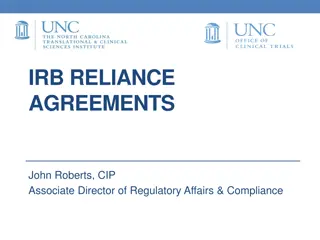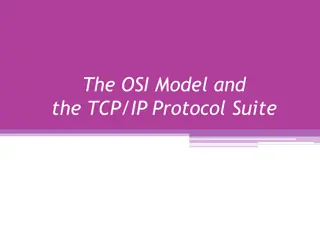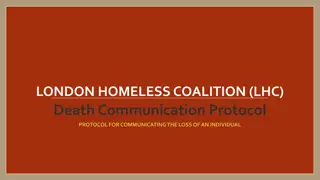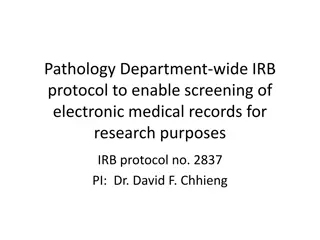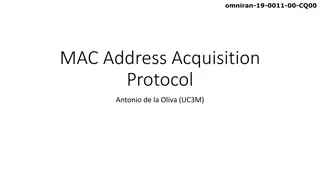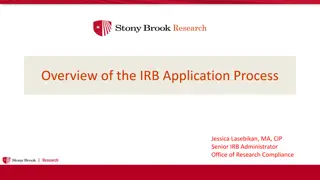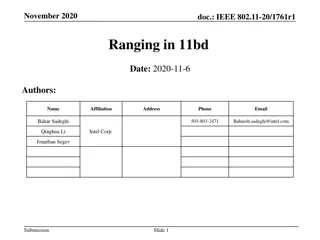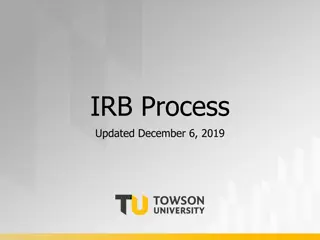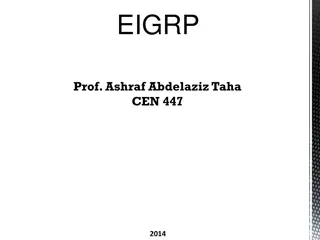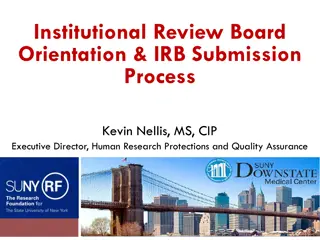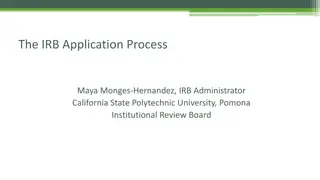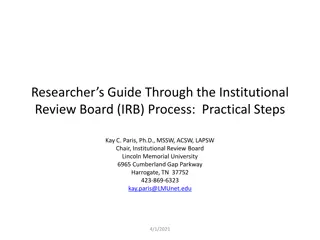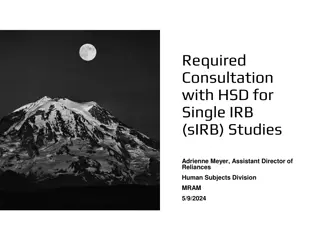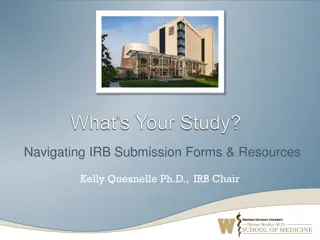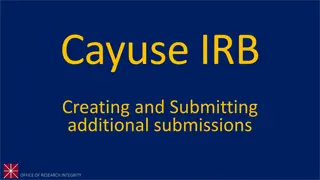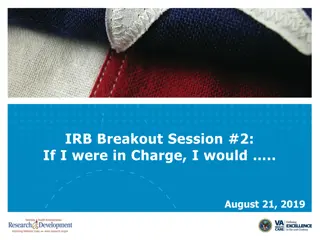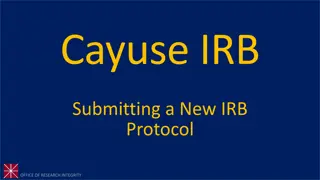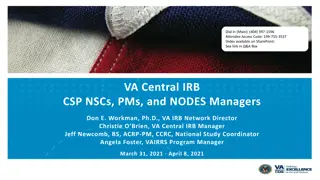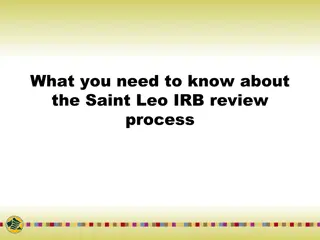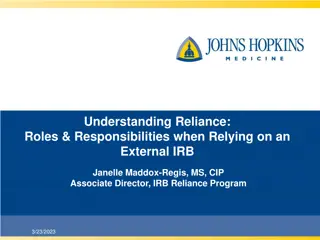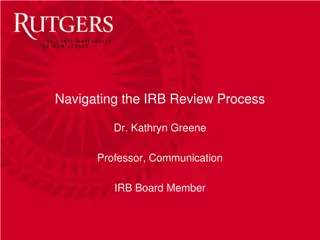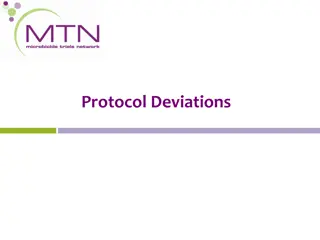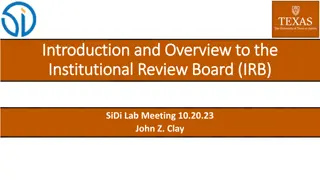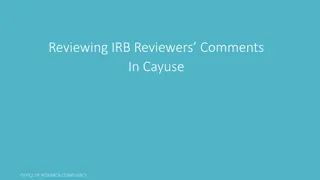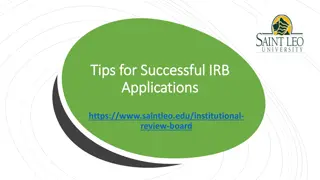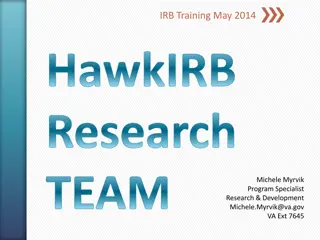Adaptive Tree-based Convergecast Protocol
Adaptive tree-based protocol for managing overlay networks in heterogeneous networks. It proposes improvements to the existing Tree-Based Convergecast Routing (TBCR) protocol by considering additional parameters such as RTT, power consumption, link stability, and link mobility to optimize routing de
32 views • 12 slides
Understanding IRB Review Process for Expedited Research
Learn about the significance of IRB review, levels of review, and categories of expedited review. Discover the criteria for IRB review, including whether the study involves human subjects and contributes to generalizable knowledge. Explore the different levels of IRB review and the specific categori
4 views • 11 slides
Institutional Review Board Application Process
The basics of the IRB, researcher responsibilities, IRB members, and the role of faculty advisors and student investigators in navigating the IRB application process. Understand the importance of ancillary approvals for research projects involving human subjects.
1 views • 19 slides
Understanding IRB Review Process for Research Studies
The content provides an overview of the IRB review process for research studies, including what necessitates IRB review, the levels of IRB review (exempt, expedited, full board), examples of full board research, and criteria for an Investigational New Drug.
1 views • 17 slides
Understanding Responsible Conduct of Research and IRB Overview
Delve into the world of research ethics through an overview of Institutional Review Boards (IRB), regulations governing human subjects research, historical events shaping research ethics, and examples of research controversies. Explore key ethical principles and the role of the IRB in protecting res
3 views • 34 slides
Understanding IRB Review Levels and Exempt Determinations
Explore the levels of IRB review for human participant research, including Exempt, Expedited, and Full Board reviews. Learn about the categories of Exempt Determinations and the criteria for Limited IRB Review. Understand if your study requires IRB review based on research and human subject involvem
1 views • 12 slides
First-Time Researcher's Guide: Navigating the IRB Submission Process at Barry University IRB January 2023
Providing essential guidance for first-time researchers submitting to the Barry University IRB in January 2023. Covers initial steps such as creating an IRBNet account, completing ethics training, determining the review category, and selecting the appropriate protocol form.
0 views • 40 slides
Understanding IRB Reliance Agreements in Research
IRB reliance agreements allow institutions to delegate IRB review responsibilities or collaborate with other institutions for human subjects research. Federalwide assurance (FWA) documents ensure compliance with regulations. Different types of agreements, such as IRB authorization agreements and ind
0 views • 23 slides
Understanding OSI Model and TCP/IP Protocol Suite
Explore the concept of layering in data communication, comparing the OSI model and TCP/IP protocol suite. Learn about protocol layers, protocol hierarchies, and the functionality of each layer in these models. Discover the interrelationships between layers and the evolution from OSI to TCP/IP.
5 views • 57 slides
London Homeless Coalition (LHC) Death Communication Protocol
In 2014, the Memorial Committee of the London Homeless Coalition (LHC) established the Death Communication Protocol to acknowledge, share, and address the loss of individuals experiencing homelessness. The protocol aims to inform partnering organizations of confirmed or unconfirmed deaths, support g
0 views • 12 slides
Understanding Mobile Computing and TCP/IP Protocol Suite
Mobile computing is crucial for continuous internet connectivity regardless of physical location. The TCP/IP protocol suite, consisting of Transmission Control Protocol (TCP) and Internet Protocol (IP), forms the backbone of internet infrastructure. IP addressing and mobility challenges are addresse
1 views • 51 slides
Pathology Department IRB Protocol for Electronic Medical Records Screening
Pathology Department's IRB protocol enables the screening of electronic medical records for research purposes, allowing members to review patient records and pathology slides. By fulfilling specific requirements and obtaining blanket IRB approval, researchers can access and analyze patient data for
0 views • 16 slides
Understanding OSI Model and TCP/IP Protocol Suite in Computer Networking
This chapter explores the OSI model and TCP/IP protocol suite, delving into protocol layers, addressing mechanisms, and network components. It highlights the interface between layers, functions of each layer in the OSI model, and compares TCP/IP protocol suite layers with OSI model layers. The discu
0 views • 30 slides
MAAP Protocol Overview in IEEE 1722: Address Acquisition and Message Format
The MAAP (Multicast Address Acquisition Protocol) is defined in IEEE 1722 for time-sensitive applications in bridged local area networks. It involves acquiring multicast addresses through claiming, probing, and defending messages. MAAP enables dynamic allocation of addresses and defending against co
1 views • 8 slides
Guidelines for GPS IRB Application Process at Pepperdine University
The GPS IRB at Pepperdine University focuses on protecting the rights and welfare of human research subjects. Applications cover social, behavioral, and educational research, following federal regulations. IRB approval is required before starting any research activities, and different application ty
0 views • 12 slides
Understanding the IRB Application Process Overview
This comprehensive overview delves into the IRB application process, covering topics such as human research protections, IRB oversight requirements, different types of reviews, informed consent, response to IRB correspondence, common errors, and the significance of ethics in research. Key historical
0 views • 27 slides
IEEE 802.11-20/1761r1 Ranging Protocol for 11bd
This document outlines the ranging protocol proposed for IEEE 802.11-20/1761r1, focusing on RTT-based ranging leveraging multi-channel operation. By integrating the 11az ranging protocol, it enables flexible and low-overhead application in 11bd for improved accuracy in ITS bands. The protocol includ
1 views • 13 slides
Understanding Institutional Review Board (IRB) Process
Institutional Review Board (IRB) plays a crucial role in ensuring research involving human subjects adheres to ethical standards. This summary provides insights into the IRB process, including determining the need for IRB review, defining human subjects research, and the importance of human subjects
0 views • 20 slides
Understanding EIGRP: A Comprehensive Overview
Enhanced Interior Gateway Routing Protocol (EIGRP) is a dynamic routing protocol providing various advantages to network administrators. It is a classless routing protocol supporting VLSM and is considered an Interior Gateway Protocol (IGP). EIGRP uses advanced distance vector routing and is known f
1 views • 5 slides
Institutional Review Board (IRB) and Quality Assurance Overview
Institutional Review Board (IRB) plays a crucial role in protecting the rights and welfare of research participants, ensuring the validity, ethics, and compliance of human research. This content covers the functions of IRB as a Privacy Board, distinguishes Downstate and non-Downstate workforce inves
0 views • 27 slides
Streamlined IRB Application Process Guidelines
Enhance your understanding of the IRB application process with helpful resources, step-by-step instructions, and access to training modules. From CITI certification to Cayuse navigation, this comprehensive guide aims to simplify the protocol submission journey for researchers. Explore hints, example
4 views • 11 slides
Navigating the Institutional Review Board (IRB) Process: A Practical Guide
Understanding the IRB process is crucial for conducting ethical research involving human subjects. This guide outlines federal regulations, protective mechanisms, IRB goals, and the definition of human subjects in research. It also provides insights into the level of intervention, considerations whe
1 views • 26 slides
Guidance on Single IRB (sIRB) Consultation for Multi-Institutional Studies
This resource provides detailed guidance on the requirements and processes for consulting with the Human Subjects Division (HSD) for single Institutional Review Board (IRB) studies involving multiple institutions, federally-funded research, and new NIH funding. It includes information on when a sIRB
0 views • 6 slides
Understanding Not Humans Subjects Research (NHSR) Determinations
Maria Drayton, an IRB Analyst at the University of Maryland, presents important information on Not Humans Subjects Research (NHSR). This includes definitions, IRB review requirements, evaluation criteria, and actions to take based on research determinations. The process involves careful consideratio
0 views • 19 slides
Navigating IRB Submission Forms & Resources with Dr. Kelly Quesnelle
Explore the essential criteria for human subjects research, the process of applying to the IRB for determinations, understanding regulated research, and common errors in exemption submissions. Delve into expedited vs. full board reviews and different categories of research review, in this detailed g
0 views • 52 slides
Cayuse IRB: Creating and Submitting Additional Submissions
This tutorial is for researchers (PIs) with an approved IRB protocol who want to make changes to their study titles and submit renewals, modifications, incidents (adverse events), or closures. Learn about the process in Cayuse, from initial study to amending/modifying, renewing, or closing protocols
0 views • 17 slides
Enhancing VHA Policy for Effective IRB and R&D Functions
Explore the potential VHA policy changes that can streamline IRB and R&D committee responsibilities to better serve veterans while upholding the VA's mission. Delve into questions concerning beneficial and challenging policy changes, the need for a single R&D committee model, and considerations on t
0 views • 6 slides
Guideline for Submitting a New IRB Protocol
This tutorial provides step-by-step instructions for submitting a new IRB protocol in Cayuse IRB. It covers essential preparatory steps, authentication requirements, logging in to Cayuse, navigating the platform, and initiating a new study application. Helpful tips are included for Primary Investiga
0 views • 24 slides
VA Central IRB Process Changes Update
Changes in the VA Central IRB process include updates regarding IRBNet access, project ownership, submission workflow, and COI review procedures. Important points include registering for an IRBNet account, transferring project ownership to PIs or LSIs, and submitting new projects to local research a
0 views • 27 slides
Understanding Saint Leo IRB Process
Discover the Saint Leo IRB review process, its purpose, requirements for research approval, definitions of human subjects and research, and how to apply for IRB approval. Learn about the exclusion criteria for class activities and access useful resources and guidance for conducting research at Saint
0 views • 17 slides
Understanding IRB Reliance: Roles and Responsibilities
This content delves into the roles and responsibilities involved when relying on an external IRB, covering regulatory requirements, the reliance request process, why local context review is essential, and more. It discusses NIH policies, the use of a single IRB for multi-site research, exceptions to
0 views • 40 slides
Understanding the IRB Review Process: A Comprehensive Overview by Dr. Kathryn Greene
Delve into the essential aspects of the IRB review process with Dr. Kathryn Greene, a professor and IRB board member. Explore the historical context, regulations, significance, and procedures involved in navigating the IRB review process. Gain insights into the importance of IRB in protecting human
0 views • 27 slides
Understanding Protocol Deviations in Clinical Trials
Protocol deviations are expected occurrences in clinical trials that may arise from site or participant actions. It is crucial for research teams to identify, report, and learn from these deviations to ensure the integrity and safety of the study. Mechanisms for identifying and reporting deviations,
0 views • 16 slides
Introduction to Institutional Review Board (IRB): Overview and Application Process
This detailed content provides an introduction and overview of the Institutional Review Board (IRB), covering its history, purpose, application process, and available resources. The IRB ensures that research involving humans adheres to ethical principles and regulatory requirements to protect partic
0 views • 4 slides
Reviewing IRB Reviewers' Comments in Cayuse Tutorial
This tutorial guides Investigators (PIs and co-PIs) on how to review IRB reviewer comments in Cayuse after receiving a protocol application feedback. It includes steps on logging into Cayuse, accessing the study details, addressing reviewer comments, and making necessary changes in the protocol. Vis
0 views • 14 slides
How to Submit Additional Study Submissions in Cayuse for Researchers
This tutorial guides researchers through the process of submitting additional study submissions in Cayuse for tasks such as renewal, modification, incident reporting, or closure, assuming they have an approved IRB protocol. It explains key steps, like logging in, selecting the study, choosing the ty
0 views • 13 slides
Seeking a General-Purpose CCSDS Link Layer Protocol: Next-Generation Data Link Protocol (NGDLP)
This document discusses the proposed Universal Frame Format for a next-generation data link protocol, focusing on major questions about transfer frames, Protocol Link Transmission Unit (PLTU), and Universal Transfer Frame Structure. It explores topics such as frame formats, telemetry transfer frames
0 views • 24 slides
NT Awake Proning Protocol for Non-Intubated Patients
This protocol outlines the benefits and procedure for prone positioning in non-intubated patients experiencing mild to moderate hypoxemia. It highlights patient eligibility criteria, equipment required, and considerations for nursing care. The protocol emphasizes improving oxygenation by promoting a
0 views • 11 slides
Guide to Successful IRB Applications Process
Understand the importance of an Institutional Review Board (IRB) for ethical research conduct. Learn about the purpose of an IRB, dispelling myths, roles of faculty advisors and students, and the approval process. Double IRBs may be required in certain cases. Follow the outlined steps for a successf
0 views • 16 slides
IRB Training Requirements for Research Team Members at VA Facilities
New members joining the IRB-03 Research Team at VA facilities must complete specific VA training and administrative tasks before gaining access to data processing equipment. Activities must align with VA appointment types, including Without Compensation, Term/temporary, and Contract Appointments. Th
0 views • 7 slides

